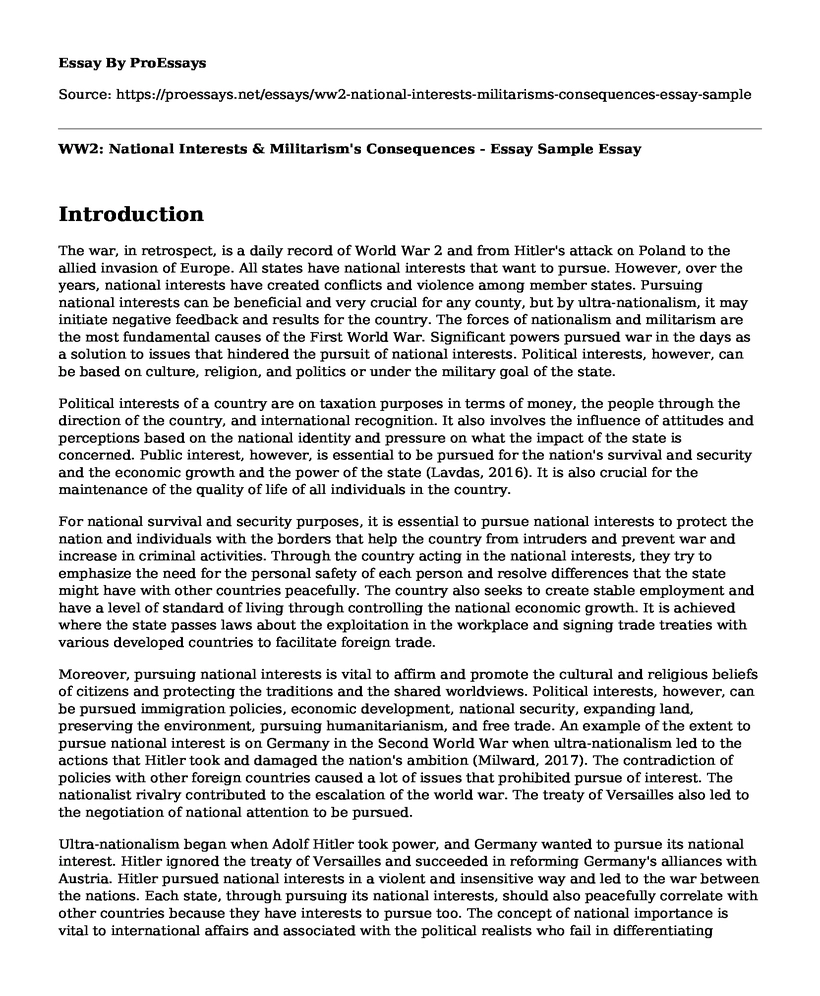Introduction
The war, in retrospect, is a daily record of World War 2 and from Hitler's attack on Poland to the allied invasion of Europe. All states have national interests that want to pursue. However, over the years, national interests have created conflicts and violence among member states. Pursuing national interests can be beneficial and very crucial for any county, but by ultra-nationalism, it may initiate negative feedback and results for the country. The forces of nationalism and militarism are the most fundamental causes of the First World War. Significant powers pursued war in the days as a solution to issues that hindered the pursuit of national interests. Political interests, however, can be based on culture, religion, and politics or under the military goal of the state.
Political interests of a country are on taxation purposes in terms of money, the people through the direction of the country, and international recognition. It also involves the influence of attitudes and perceptions based on the national identity and pressure on what the impact of the state is concerned. Public interest, however, is essential to be pursued for the nation's survival and security and the economic growth and the power of the state (Lavdas, 2016). It is also crucial for the maintenance of the quality of life of all individuals in the country.
For national survival and security purposes, it is essential to pursue national interests to protect the nation and individuals with the borders that help the country from intruders and prevent war and increase in criminal activities. Through the country acting in the national interests, they try to emphasize the need for the personal safety of each person and resolve differences that the state might have with other countries peacefully. The country also seeks to create stable employment and have a level of standard of living through controlling the national economic growth. It is achieved where the state passes laws about the exploitation in the workplace and signing trade treaties with various developed countries to facilitate foreign trade.
Moreover, pursuing national interests is vital to affirm and promote the cultural and religious beliefs of citizens and protecting the traditions and the shared worldviews. Political interests, however, can be pursued immigration policies, economic development, national security, expanding land, preserving the environment, pursuing humanitarianism, and free trade. An example of the extent to pursue national interest is on Germany in the Second World War when ultra-nationalism led to the actions that Hitler took and damaged the nation's ambition (Milward, 2017). The contradiction of policies with other foreign countries caused a lot of issues that prohibited pursue of interest. The nationalist rivalry contributed to the escalation of the world war. The treaty of Versailles also led to the negotiation of national attention to be pursued.
Ultra-nationalism began when Adolf Hitler took power, and Germany wanted to pursue its national interest. Hitler ignored the treaty of Versailles and succeeded in reforming Germany's alliances with Austria. Hitler pursued national interests in a violent and insensitive way and led to the war between the nations. Each state, through pursuing its national interests, should also peacefully correlate with other countries because they have interests to pursue too. The concept of national importance is vital to international affairs and associated with the political realists who fail in differentiating policies from the idealistic systems in promoting solutions to the multinational states to enhance the independence of states (Blusse & Gaastra, 2016). When leaders try to pursue national interests without care, it will create conflicts with other countries and might cause war. Therefore it is essential to have an extent to pursue national interests.
Reference
Blusse, L., & Gaastra, F. S. (2016). In the eighteenth century as a category of Asian history: Van Leur in retrospect. Routledge. Retrieved from https://www.taylorfrancis.com/books/9781315247663
Lavdas, K. A. (2016). The Europeanization of Greece: Interest Politics and the crises of integration. Springer. Retrieved from https://books.google.com/books?hl=en&lr=&id=uy6_DAAAQBAJ&oi=fnd&pg=PR10&dq=extent+of+pursue+of+national+ineterests&ots=v6IrRsXtEK&sig=kVpQLEj-oIcehyx0HGpvoCqMPTA
Milward, A. (2017). The frontier of national sovereignty: history and theory 1945-1992. Routledge. Retrieved from https://content.taylorfrancis.com/books/download?dac=C2014-0-35268-3&isbn=9781351544481&format=googlePreviewPdf
Cite this page
WW2: National Interests & Militarism's Consequences - Essay Sample. (2023, Mar 17). Retrieved from https://proessays.net/essays/ww2-national-interests-militarisms-consequences-essay-sample
If you are the original author of this essay and no longer wish to have it published on the ProEssays website, please click below to request its removal:
- War and Oppression During the Battle of Stalingrad
- Roles of Federal Reserve During Financial and Economic Crisis Essay
- Pepys's Diaries Essay Example
- Salem Witch Trail Paper Example
- Essay Example on Ibrahim Kalin: Turkish Presidential Press Secretary & Georgetown Teacher
- Research Paper on Cold War: A Historical Analysis of its Causes and Effects
- Civilization in Mesopotamia, Egypt and China - Essay Sample







